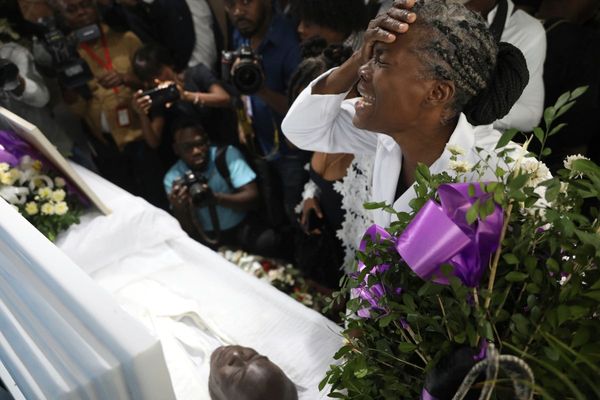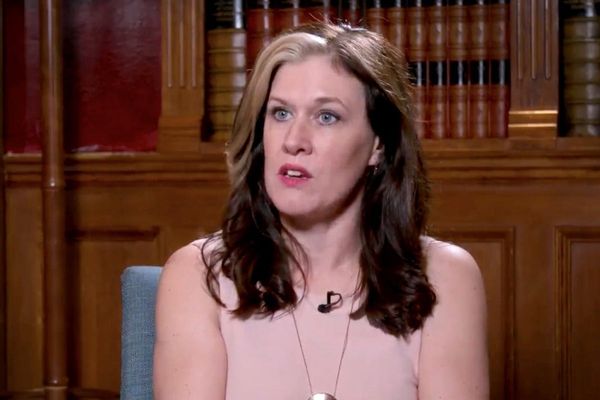
The State Department has canceled briefings with congressional oversight staff on counterterrorism issues and the closure of a U.S. diplomatic outpost in China amid deteriorating relations between Secretary of State Mike Pompeo and Democrats on the House Foreign Affairs Committee, according to congressional aides and officials familiar with the matter.
The House Foreign Affairs Committee had worked with the State Department to schedule briefings this week with diplomats on the closure of the U.S. Consulate in Chengdu, China, as tensions between Washington and Beijing escalate. Diplomats were also set to brief Congressional staff the recent takeover of a key port city in Mozambique near huge deposits of natural gas by a militant group linked to the Islamic State, as well as counterterrorism efforts in the Sahel region of West Africa.
But on Monday evening, the State Department abruptly informed the committee that the previously scheduled briefings were off, in part citing an Aug. 7 letter that Pompeo sent to the committee’s chairman, Rep. Eliot Engel, about the committee’s ongoing investigation into the firing of the State Department’s top watchdog.
In the letter, Pompeo rebuked Engel for saying that the State Department was “stonewalling” an investigation into President Donald Trump’s firing of Steve Linick, the State Department inspector general, in May. Pompeo referred to Engel’s assertions as “outrageous” and said the committee rebuffed efforts by the State Department to accommodate its investigation.
Congressional aides said it would be inappropriate to halt staff-level briefings on issues unrelated to any dispute between the department and committee over the inspector general investigation. “It’s incredibly petty, even for this State Department, that they’re pulling down these staff briefings on legitimate security matters because they don’t like that the Foreign Affairs Committee is conducting oversight,” said one Democratic congressional aide.
In an email response, a State Department spokesperson defended halting staff-level briefings, citing committee treatment of State Department officials who have testified in the past. “The House Foreign Affairs Committee’s unwillingness to engage in the Constitutionally-mandated accommodation process has compelled multiple career and non-career Department officials to seek personal counsel at great expense,” the spokesperson said. “In addition, at least one has been accused of lying before Congress without being given the opportunity to clear his name in an open hearing. The Committee’s treatment of officials is not one that is limited to one ‘issue area,’ so the Secretary’s direction with respect to engagements with the Committee is not limited by issue area.”
“If the Chairman and his staff are unwilling to accept the testimony of Department officials, what is the point of sending up additional Department officials to brief his staff on any topic if their testimony won’t be accepted?” the spokesperson added.
“The State Department doesn’t get to dictate how Congress conducts oversight. Their half-truths and falsehoods are a distraction. The record is clear that they’ve tried to thwart this committee’s oversight efforts at nearly every turn,” a Democratic committee aide said in response. The “briefings they cancelled have nothing to do with the committee’s oversight efforts. They’re playing games with issues that bear on our national security,” the aide added.
China closed the U.S. consulate in Chengdu late last month after the Trump administration shuttered the Chinese consulate in Houston, which U.S. officials alleged may have been used to conduct industrial espionage against research universities and hospitals looking for a vaccine for the novel coronavirus. The briefings also would have given experts who staff the committee a chance to discuss with administration officials counter-terrorism efforts in the Sahel as reports of a potential coup in Mali emerge and the takeover of a Mozambique port, located near natural gas reserves worth more than $60 billion, by an Islamic State-linked group last week. The Defense Department told Foreign Policy it is “aware of and concerned by” the threat in Mozambique. The Pentagon is conducting a review of its operations in Africa that could limit the U.S. footprint on the continent in the future.
Government agencies and the congressional committees that oversee them routinely organize closed-door briefings between agency officials and committee staff.
Democratic lawmakers have accused Pompeo’s State Department of refusing to cooperate on other matters, including the Democratic-led impeachment investigation earlier this year. Trump was acquitted of charges of abuse of power and obstruction of Congress on mostly partisan lines in February.
The State Department spokesperson said that in the last 12 months, the department has supplied over 500 reports to Congress, responded to over 2,000 written questions, provided over 2,000 briefings to members, responded to over 1,200 congressional letters, and supported nearly 600 congressional trips.
At the time of his ouster, Linick, the State Department inspector general, was investigating allegations that Pompeo expedited weapons sales to Saudi Arabia over congressional objections and allegations that Pompeo was misusing State Department resources. Pompeo has flatly rejected these allegations and said he was not aware of them at the time of Linick’s firing. Linick was replaced in an acting capacity by Stephen Akard, a political appointee at the State Department who was a close ally of Vice President Mike Pence. Earlier this month, Akard resigned from the post—less than three months into the job.
Pompeo sent his Aug. 7 letter to Engel days after the House Foreign Affairs Committee chairman subpoenaed four top State Department aides to testify over Linick’s firing. “The Administration continues to cover up the real reasons for Mr. Linick’s firing by stonewalling the Committees’ investigation and refusing to engage in good faith,” Engel said in a joint statement announcing the subpoenas, alongside House Oversight Chairwoman Carolyn Maloney and Sen. Bob Menendez, the top Democrat on the Senate Foreign Affairs Committee. “That stonewalling has made today’s subpoenas necessary.”
Pompeo in his letter responding to Engel said the House Foreign Affairs Committee had rejected State Department offers to supply testimony and information to accommodate their investigation. “[L]et me express how outrageous it is for you to suggest that the Department is ‘stonewalling’ any investigation into the President’s replacing of Steve Linick,” Pompeo wrote in the letter. “For the past three months, you have refused every offer and attempt by the Department to reach a mutual agreeable accommodation to provide you with the information you purport to seek.”
“I have directed Department officials to prioritize hearing and briefing requests for other Committees and Members who continue to adhere to good-faith efforts of accommodation and who treat all Department employees with the professionalism and respect they deserve,” he wrote.
Engel first invited senior State Department officials to testify on Linick’s firing in May. In July, the committee agreed to a State Department request to delay a hearing with Undersecretary of State for Management Brian Bulatao on the matter after the inspector general filed its report on the arms sales. Bulatao has yet to appear before the committee.
Linick’s ouster and the controversy over Pompeo’s move to expedite arms sales to Middle Eastern partners exacerbated already fraught relations between the State Department and congressional overseers.
In a final report released earlier this month, the State Department’s Office of Inspector General ruled that the agency used proper procedures to issue an emergency declaration that allowed the Trump administration to route $8.1 billion in arms sales to Saudi Arabia, the United Arab Emirates, and Jordan over congressional objections, but the department did not properly assess the humanitarian impact of the move.
After Politico published an unredacted version of the report, one Democratic congressman, Rep. Andy Levin, accused the State Department’s top political-military affairs official, R. Clarke Cooper, of lying about whether an emergency actually necessitated the sale. The unredacted version showed that the State Department had begun planning an emergency declaration weeks earlier.
“The timeline in the unclassified, unredacted report makes clear that Secretary Pompeo wasn’t reacting to an emergency in May 2019, but rather was carrying out a plan that was months in the making,” wrote Engel and Levin in a statement released on Aug. 14. “If this factually inaccurate statement was made intentionally, it was a lie to Congress, and lying to Congress is a federal crime.”
Update, Aug. 18, 2020: This article was updated with response from a State Department spokesperson and Democratic aide on the House Foreign Affairs Committee.







